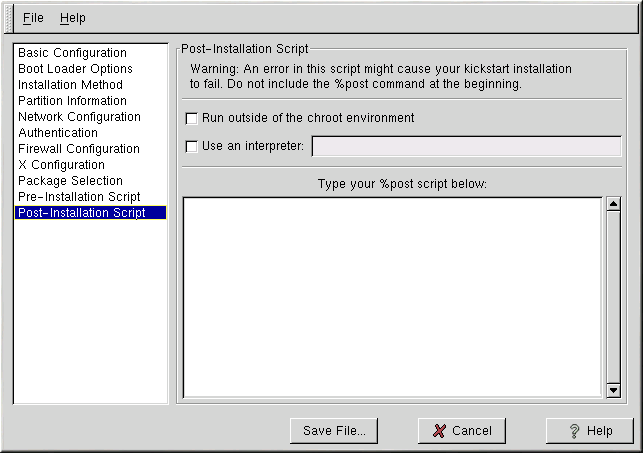Post-Installation Script
You can also add commands to execute on the system after the installation is completed. If you have properly configured the network in the kickstart file, the network is enabled. If you would like to include a post-installation script, type it in the text area.
 | Caution |
|---|---|
Do not include the %post command. It will be added for you. |
For example, to change the message of the day for the newly installed system, add the following command to the %post section:
echo "Hackers will be punished!" > /etc/motd |
Chroot Environment
If you want your post-installation script to run outside of the chroot environment, click the checkbutton next to this option on the top of the Post-Installation page. This is equivalent to the using the --nochroot option in the %post section.
 | Tip |
|---|---|
If you want to make any changes to the newly installed filesystem in the post-installation section outside of the chroot environment, you need to append the directory name with /mnt/sysimage. |
For example, if you check the Run outside of the chroot environment button, the previous example needs to be changed to the following:
echo "Hackers will be punished!" > /mnt/sysimage/etc/motd |
Use an Interpreter
If you want to specify a scripting language to use to execute your script, click the Use an interpreter button and enter the interpreter in the text box beside the button. For example, /usr/bin/perl can be specified for a Perl script. This option corresponds to using %post --interpreter /usr/bin/perl in your kickstart file.
Examples
The post-installation script can be used to perform any useful functions such as the following examples.
Turn services on and off:
/sbin/chkconfig --level 345 telnet off /sbin/chkconfig --level 345 finger off /sbin/chkconfig --level 345 lpd off /sbin/chkconfig --level 345 httpd on |
Run a script named runme from an NFS share:
mkdir /mnt/temp mount 10.10.0.2:/usr/new-machines /mnt/temp open -s -w -- /mnt/temp/runme umount /mnt/temp |
Add a user to the system:
/usr/sbin/useradd bob /usr/bin/chfn -f "Bob Smith" bob /usr/sbin/usermod -p 'kjdf$04930FTH/ ' bob |
